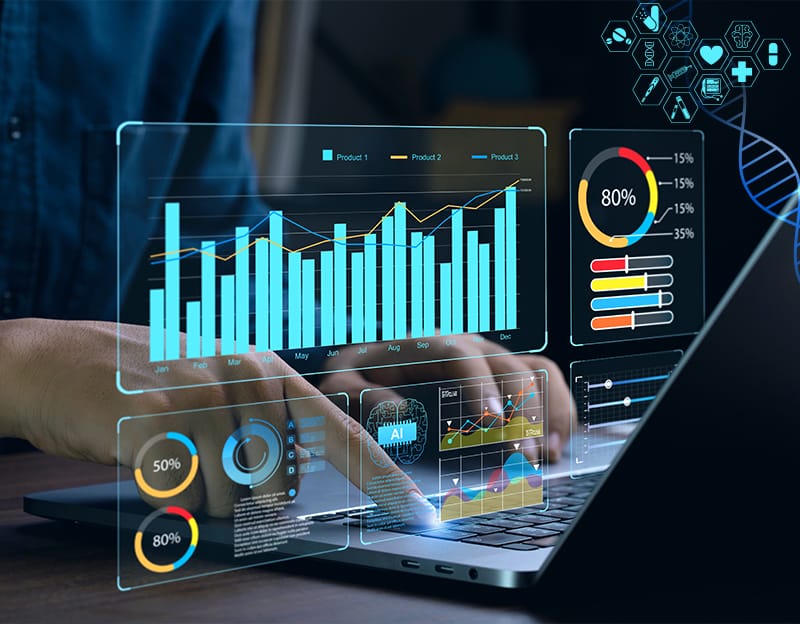Within the constantly changing pharmaceutical sector, data analytics has become a potent transformative catalyst. Modern technology and data-driven insights are transforming how pharmaceutical businesses operate and innovate, which will ultimately lead to better patient outcomes. We will examine the many uses, advantages, and promising future of data analytics as we examine its significant influence on the pharmaceutical industry in this blog post. Additionally, a thorough FAQ section will answer some often asked questions.
1. Speeding up the development of new drugs
The process of finding new drugs has always been time-consuming and costly. But this journey has been considerably shortened by data analytics. Expert systems examine enormous amounts of data to help scientists find possible drugs, forecast how well they work, and even anticipate side effects. Drugs that could save lives are now available to patients more quickly thanks to the quick speed at which drug research is progressing.
2. Individualization of Care in Personalized Medicine
Data analytics pharmaceutical industry is helping to slowly usher in the end of the one-size-fits-all medical age. Pharmaceutical companies can develop individualized treatment programs by examining patient histories, lifestyle decisions, and genetic data. Patient satisfaction and outcomes are enhanced as a result of this customized strategy, which guarantees that patients receive the best treatments with the fewest adverse effects.
3. Improving Clinical Trial Results
Pharmaceutical research relies heavily on clinical trials, yet these studies can be resource- and time-intensive. An essential component of optimizing these studies is data analytics. Researchers can find qualified applicants, expedite the hiring process, and track the status of trials in real time by evaluating patient data. These discoveries improve clinical trial efficiency, facilitating speedier outcomes and a shorter route to regulatory approval.
4. Predictive Analytics for Inventory Control and Demand Forecasting
Pharmaceutical businesses have to deal with complex inventory control and supply chains. In order to forecast demand precisely, predictive analytics makes use of previous data and industry patterns. This avoids shortages and lowers the expenses associated with excess inventory by guaranteeing that the appropriate pharmaceuticals are available when and where they are needed.
5. Improving Compliance with Regulations and Drug Safety
Drug safety must be guaranteed at all costs in the pharmaceutical sector. By tracking unfavorable occurrences, data analytics services enables businesses to spot trends and take prompt action in the event of a safety issue. Furthermore, by evaluating enormous volumes of data pertaining to production, quality assurance, and adverse event reporting, analytics tools support regulatory compliance. By taking a proactive strategy, pharmaceutical companies are certain to follow strict rules and stay out of trouble.
6. Enhancing Patient Involvement and Medical Results
Beyond the lab and executive suite, data analytics solutions is improving patient interaction. Patients generate important data with wearables and health applications. Pharmaceutical businesses can use this data to learn more about the general health, medication adherence, and behavior of their patients. Businesses can create interventions and support systems that enable people to properly manage their health by recognizing these tendencies.
FAQ’s
Q1: Is it possible to use data analytics at every stage of the drug development process?
A1: Clinical trials, post-marketing surveillance, and early drug discovery all make use of data analytics. It helps researchers track real-world medication outcomes, optimize trial designs, and find promising drug candidates.
Q2: How can patients benefit from individualized medicine?
A2: Personalized medicine adjusts medical interventions according to a patient’s genetic composition and medical background. This method increases overall patient satisfaction and well-being, reduces adverse responses, and improves therapeutic efficacy.
Q3: When using data analytics, what difficulties do pharmaceutical businesses encounter?
A3: Integrating many data sources, maintaining regulatory compliance, and data security issues are challenges. Working with data specialists and implementing strong data governance methods are frequently necessary to overcome these obstacles.
Q4: How might data analytics assist pharmaceutical businesses in responding to new health emergencies?
A4: Certainly. Patterns, outbreaks, and disease propagation can all be predicted using data analytics in pharmaceutical industry. Authorities and drug manufacturers can react quickly, create efficient therapies, and manage resources with the aid of this real-time information.
Q5: When adopting data analytics, how can pharmaceutical businesses guarantee the protection of patient data?
A5: It’s critical to protect patient data. To secure patient privacy and confidentiality, pharmaceutical businesses must use cutting-edge encryption techniques, follow stringent data protection standards, and make sure that data is anonymized and de-identified.
In conclusion, Data Analytics Will Shape the Future of Healthcare
The pharmaceutical business is leading the way in innovation in this data-driven era. Companies that utilize data analytics are not only increasing their profitability but also making a significant contribution to the development of universally accessible, cost-effective, and tailored healthcare in the future. The combination of data analytics skills with pharmacological knowledge will surely lead to ground-breaking discoveries and a better, more connected world in the future. Pharmaceutical data analytics is leading the pharmaceutical business toward a more promising and productive future. The transformation has already started.


